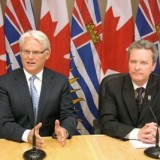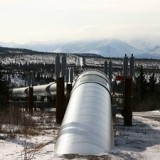Article by Rafe Mair in The Tyee.
“In my lifetime I have witnessed four political meltdowns, four parties that had the wheels fall off. They were: The Bennett crash, the Zalm slam, the Kim Campbell gamble, and the New Dem sinking.”
Read article
All posts by Rafe Mair

Why Cantankerous Rafe Won’t Go Away
Wendy and I have just returned from a week in London – we try to do that once, hopefully twice a year and it usually happens when Wendy comes up to my computer to which I’m attached by memory stick and says, “Love – time for London so you can take off the 10 years put on since we were there in January”.
This time I was forbidden to bring my laptop or in any way make contact with news from home so that last Friday I came home to just under 500 emails most of which were concerned about my sex life. But I did get three emails that struck home, all three of which dealt with the constant question I hear: Rafe (sometimes the appellation isn’t as polite as that) why don’t you quit?
My stock answer is that I missed 50, 55, 60, 65, 70 and 75 so it’s too late.
But back to the three letters.
#1 asked “Dear bleep, why don’t you (international term for go away) and give yourself and us a permanent break?”
#2 informed me of my new American Express card and # 3 was my new disabled parking card, both of which expire in 2013, forcing me to ask myself what were the odds of me not expiring before they do.
#2 and #3 seemed to me as making the answer to #1 obligatory which I beg leave to make right here.
I was born cantankerous, which I learned as I went was a rejection of accepted wisdom and a lifetime disagreement with the “establishment” – of which my family were definitely a part. For as long as I can remember I questioned things like the Monarchy, racist policies, treatment of the poor, and the unlucky and rejected the notion that the poor were lazy louts looking for a societal hand-out. I was a child of the 40s, 50s, and 60s, when great social upheavals were taking place all over the world. Oddly enough, I never became a CCF/NDP supporter because they always seemed to me to be long on recognizing and reporting societal ills and short on practical solutions.
I grew up in Vancouver when there were still trout streams, dank woods with semi-lakes that held salamanders and oceans full of fish. This made me an easy target for environmentalism though I admit this happened over time – a time when, like everyone else, I threw cigarette packages and the finished cigarettes away where I happened to be when finished, lobbed beer cans out of the car window, and killed far more fish than I could ever use. When now I moan at environmental desecration there’s a healthy dose of uneasy conscience involved.
My epiphany (for want of a better term) as an environmentalist coincided with a learning curve that exposed an unalterable truth: the establishment, including the business community and the people they bought and paid for, and sometimes even trade unions, will lie through their teeth if it suits them and the older I get, the more obvious that is.
I realize that this is scarcely a new phenomenon but it clearly continues to grow until we’ve reached the state where a Premier and his government lie as a necessary strategy for the way they rule us and a media which, because of the way they conduct themselves, aid and abet this lying by ignoring it.
I think my anger became white-hot and remained so with the Charlottetown Accord, an issue I had been deeply involved with in its spawning years during the Trudeau regime’s patriation of the constitution. (I thoroughly agree with the result but I learned a great deal about government deception as the issue moved along). The Charlottetown Accord was deception practiced by the entire Canadian Establishment en masse. One large media company, MacLean Hunter, even registered on the “Yes” side for God’s sake! Capital, Labour, academics, the artsy-fartsy put their own interests ahead of the national issue and fortunately the public found that out.
I got involved in the Kemano II issue and saw how a conspiracy of industry and government could cover up the hugeness of their calamitous policy which was only thwarted when the DFO scientists, who had been eased out of their positions by a compliant DFO, blew the whistle and Premier Mike Harcourt had the guts to do the right thing.
Then came the issue of a gravel pit in the Pitt River system – which again was industry not giving a damn about the environmental consequences – and was stopped in its tracks by Premier Glen Clark.
This takes us to the fish farm debacle and the courageous fight led by Alexandra Morton in the face of a government that wanted to put her in jail for exposing the rape of our waters by offshore companies which knew, because of their experience elsewhere, that siting fish farms in the path of migrating salmon would spell death to the salmon. We saw and continue to see a government, elected by the people of BC, lying, obfuscating and burying evidence – all of which they continue to do to this day.
Then came the 2002 “Energy Policy” where in each and every manifestation depends upon a coalition of greedy capital and dishonest government to continue to destroy our environment to make multi billions of dollars for the likes of General Electric and Warren Buffett as they sell off our electricity, extorted from BC Hydro by sweetheart deals imposed on it by the Campbell government.
Over the past 2 years it has become obvious that the Energy Policy is a tissue of lies which, far from helping BC get new power, in fact sends that power elsewhere potentially bankrupting BC Hydro, our company, in the process.
The acclaimed filmmaker, Damien Gillis, and I will be travelling around the province this fall informing people of the truth about what Campbell & Co. are doing. What’s as important if not more so, we’ll be telling citizens of BC what alternatives there are for an energy policy for British Columbians, not for Mr. Buffett and friends. Damien will be showing his marvelous videos, many guest speakers will underscore what must be stopped and what must be done, and I will be a principal speaker at them all.
My role will be to synthesize the enormous wealth of information brought to the Common Sense Canadian by its illustrious “Contributors”, outstanding British Columbians whom you will see introduced on our website, www.thecanadian.org.
Back to the main question – why don’t I just retire and go away?
From a personal standpoint, I don’t know what the hell I would do with myself if I did. And as Wendy reminds me, “I married you for better or for worse … but not for lunch!”
I admit the wisdom of Robbie Burns gave us when he observed “O wad some power the giftie gie us, to see oursels as others see us”. And it is as others see me upon which I must make my judgment.
When the time comes for me to quit, I hope I recognize that and, failing that, my comrades-in-arms let me know.
In the meantime my main effort is to make sure that I’m around to get a new disabled parking pass and a fresh Amex card in 2013.

HST Briefing Memo: Hansen & Campbell Caught Red Handed
Colin Hansen, our Finance Minister, not only isn’t telling the truth about the HST situation, he is a sniveling, cringing coward to boot. Be a Man, Hansen! Own up, level with people! You look like the kid with chocolate all over his face denying to his Mom that he pinched the chocolate bar as the store keeper alleged.
If you cannot be honest, at least stand up and admit it!
I have been saying publicly that the Premier and Hansen telling us that the HST wasn’t even on the “radar screen” was bullshit. And it was demonstrable bullshit before the document proving it was obtained by Freedom of Information request – and I’ll tell you why.
I’ve been there, folks, and I know how the system works. But first I ask you to look at your own experiences in life. If you want a change in policy in any company…in a union…in your golf club or curling club…it takes time. You must prepare the ground and anticipate the questions that will be raised and deal with them. In government it’s even more time consuming and when you have, as here, two governments involved you’re looking at months. In fact you’re looking at a starting point before March 2, 2009 when, by the document’s own words, Hansen asked for the briefing document that was just released. In fact you can be sure that discussion between the minister and his staff, and in cabinet, predated the March 2 request by weeks if not, more likely, months. Documents like this do not happen spontaneously.
The issue of the HST was in the news in the early weeks of 2009, you will remember, because it was an issue in Ontario, where Premier McGuinty was up to his ears in static. To assume that Campbell and Hansen weren’t aware and, indeed, in contact with the Ontario government strains credulity to the breaking point.
Let me give you an example from my own experience in government. In 1979 I, as Minister of Environment, was chair of the Environment and Land Use Committee which, amongst other things, heard appeals from the Land Commission. I went to Premier Bill Bennett and told him that we were getting beaten up every time an appeal came up because the appellant land owner, without doubt, was a Socred supporter and the media would have a picture of a “Vote Socred” sign on the land during the previous election. (This was in the days where the media did its duty). I suggested that we set up an appeal board to hear these appeals and he agreed.
It took three months and a damned fine lawyer from the Attorney General’s department before we had a presentation ready for cabinet.
Why did it take this time?
Amongst other things, several statutes required amendments and one had to assess what impact those amendments would have on other statutes. Numerous regulations had to be dealt with requiring orders-in-council. The unintended consequences of these changes had to be considered. All this to simply set up an appeal body that 95% of the province couldn’t have cared less about.
This was penny ante stuff compared to the complexities of harmonizing the GST and the PST.
I want to tell you the real damage this has caused. None of us tells the truth all the time. There is considerable social dissembling that takes place, otherwise we’d all be at each others throats. It’s human to exaggerate, especially when telling a story that, if told straight, would be pretty dull.
Governments gild the lily. Spin doctors work stories over and bad news is released at times it will get the least publicity – like Friday afternoons. We all know this and discount what governments say accordingly.
But we don’t expect governments and ministers to lie. That simple. We look up to the offices they hold and expect them not to dishonour them.
Our image, here at the Common Sense Canadian, of Gordon Campbell as Pinocchio, is an apt one. Whether it’s BC Rail, The Energy Policy, the size of the deficit, the HST and so on, he simply has told us falsehoods, which is as politely as one can put it. I’ve invited you before and do again to watch this 1:51 minute clip of Colin Hansen discussing his government’s private power policy – where he, with his oozing, sincere, avuncular manner, makes 5 basic statements, everyone of them untrue.
Now we have Mr Hansen – and the Premier – caught out, and do they have the courage to say, “We were wrong and we make that admission because that is the way we were brought up – to be truthful and to take the consequences of our actions like men”?
Instead we see a whimpering, sniveling Minister of the Crown trying to blame it all on the ministry.
Folks, the plain truth is this: Colin Hansen asked for the briefing note more than two months before the election and the issue was not only “on the radar screen”, it was well on its way to becoming government policy – a policy that Campbell and Hansen hid from the people during the election.
We all know what the honourable thing would be for this minister, the premier, and in fact the entire government to do. We need only look at what Campbell, as Leader of the Opposition had to say about the duty of NDP ministers under far, far less disturbing circumstances. In fact, the Premier, back in those days of Glen Clark’s troubles, made speeches which were and remain classic recitations of the duty of Her Majesty’s Ministers when under a cloud. Those speeches do not, of course, apply to Premiers thrown in jail for drunk driving and having their picture on the front pages of the nations’ newspapers and jumping out of TV sets; they don’t apply to premiers who break their promises not to privatize BC Rail, premiers who dissemble on the fish farms issue, or grossly understate the province’s deficit during an election, or privatize power while singing the praises of public power…and on it goes. No siree, these rules apply to the other folks, but not to Gordon Campbell and his lickspittles.
The truly sad part is that it’s tough enough to convince younger people that they should understand and get involved in public life, let alone ask them not to be cynical unto death about the political process, when they see how it’s been so egregiously abused by this bunch of shameful men who don’t even have the decency to be ashamed.

Politics and the Environment in BC
The chickens are coming home to roost for Premier Gordon (Pinocchio) Campbell. The question is how do we best handle the political consequences.
I spent a lot of time with Carole James during the election a year ago last May and came to like her and admire her in spite of the fact she, or rather the NDP, ran a terrible campaign. I told her partway through the campaign that it looked to me as if someone had a death wish for her.
The result wasn’t really her second loss, although it was that if one proceeds simply numerically. It’s not fair to pin the previous loss on Ms. James because she did bring the party back from the grave’s edge. The election in 2013 is hers to win or lose.
I’ve been hard on Ms. James for her present tactics of staying off the battlefield and mingling with the crowd. In fairness, that may have as much to do with my own combativeness as any other factor. I was weaned in the politics of hand-to-hand combat with lots of blood being spilt. Maybe we have to wait and see whether Ms. James and her advisers are right. In fact, she may be right – for a special reason I’ll talk about it a moment.
No one can be something they’re not. When I went into radio in 1981, the great Jack Webster had two bits of advice: if you’re interviewing your mother, have a piece of paper with Mom written on, for you’ll be amazed at whose name you can forget under pressure; and be yourself, don’t try to ape any other broadcasters including me.
Ms. James simply would not be herself if she were to enter pitched battles and try to win by noise and figurative bloodshed what you should win by reason.
Here’s the special reason Ms. James may be on the right track. For the first time I can remember, the “environment” is a big issue – indeed it’s huge. And there isn’t a nook or a cranny where this government and especially this leader are not in high odour on this issue.
In the past, governments have always been able to play off one group against another but this isn’t going to be so easy in 2013. I’ll guarantee that there will be much more unity of action by environmentalists. It will scarcely be any kind of coalition because such are simply not possible. By their very nature, many groups are concentrated on one issue or one geographical area or both. There are conflicts for available money. All have different histories. This does not mean that they cannot get together for a political purpose.
What will become, to the surprise of many no doubt, a serious matter for Campbell is the coming together for the purposes of defeating him – groups that have been and perhaps still are on separate issues in separate areas. To save this province from the wanton destruction by this government is a common goal and will bring, I believe, a much closer-knit political response.
If I’m right about the high profile of the environment and if there can be a common cause of defeating Campbell, Carole James must convince British Columbians of two things: that she cares for the environment, and that as premier she will do something about it; and she must convince people that she won’t make a balls-up of the economy.
These two factors support the notion that the NDP leader should travel the province convincing people that she will reverse the environmental policies of the Campbell gang and that she will be a safe pair of hands to run the province.
My own philosophy in the 2009 election as repeated to audiences around the country was pragmatic – I simply said that while I didn’t believe they will, if the NDP screw up the economy a later government can fix it; what a later government cannot do is bring back the destroyed rivers, the ruined salmon runs, and BC Hydro. They can be no more restored into their old form than scrambled eggs can ever go back into their shells.
But Carole James cannot win on that sort of fatalism – she must convince the public that the NDP can be trusted to do a better job than the Liberals can which is a pretty low bar indeed as I’m sure you will agree. She must convince groups around the province that she is capable and those groups must include all sections of society.
To follow such a course will take guts especially if she will be up against Carole Taylor or Dianne Watts. Of course Ms. Taylor brings her own baggage: she didn’t resign in protest as she should have and is thus responsible for much of the destructive policy of this government, and so far as I know hasn’t issued forth a peep about the Energy Policy and Fish Farms policy of the government, and, frankly, I would be surprised if knows anything about these issues. Having heard nothing to the contrary I assume she supports this government’s insane and destructive Gateway project and Deltaport enhancement.
Diane Watts is a very popular mayor of Surrey but that’s a hell of a long way from the premier’s chair in Victoria. In fact I would be surprised if Ms. Watts changed her declared position that she’s not interested.
I remain principally concerned about the environment and especially rivers and fish. I haven’t cast a fly line since 2005 so it’s not my hobby I’m fighting for but the very soul of this province, our trademark: our rivers and our salmon.
In saying that I respect and will always support other environmentalists who have their own important priorities. As John Donne said over 300 years ago and is as true today as then, “No man is an island entire of itself; every man is a piece of the continent, a part of the main”. When you ponder the truth of that powerful message it becomes clear that we must all see the bigger picture. I know that pipelines destroy fish and rivers, as tanker accidents do. We know that this government’s insane highway development destroys valuable farmland and habitat and that Burns Bog is sacred as are the Pink salmon runs in the Broughton Archipelago. As we know that the blot of destruction spreads everywhere, all of us must fight that destruction where we’re best able to do so and help others wherever they may be.
And that’s the key to success – fight our damndest in areas where we have prioritized and help others do the same as we gather together in the political arena to support those who share our values, which are no more than to save and protect our province for the sake of those who come after us.

Enbridge Pipeline: A scary vision of the future
The
hearings for the proposed Enbridge Pipeline from the Tar Sands to Kitimat have
begun – the first of these having been held recently in Whitecourt Alberta,
with more coming coming to Kitimat on August 31 and Prince George on September
8. We’ll surely be hearing a lot from
the company about the employment this project would provide. That is the ever-present
argument in any debate where the environment is threatened.
As I said
in the question period after a recent speech, if the temporary employment
provided during construction trumps environmental concerns, we might as well
all go home.
I have no
doubt that employment will be a plus for this pipeline but we must remember
that it is temporary – the damage will be permanent. And let’s be clear on this
point: there will be leaks, and a long pipeline will be an open invitation to
terrorism. Moreover, there is no guarantee that the employment will go to local
British Columbians.
And it’s
the value to this province I think we should dwell upon for a moment.
We would
have a pipeline shipping Alberta crude to China, largely through very sensitive
land in BC. Where’s the profit for us? We take the certainty of damage to our
sensitive grazing land, added to which is the certainty of s spill on our
sensitive coast – and for what? I’ve heard nothing about big bucks for the
right-of-way. We’re not getting any part of the taxes which will be paid to
Alberta and Ottawa. We are the conduit for oil sludge benefitting international
oil companies, Edmonton, Calgary, Ottawa, and Beijing. Why the hell are we even
considering this?
I talk
about certainty rather than risk. That’s because a risk, without a limit on how
long it will continue, is a certainty waiting to happen.
Last May
I wrote an article for a Russian online paper, The Strategic Culture Foundation, which I think apropos – I hope
you enjoy it.
Tuesday
January 23, 2013
Today, with the weather cold and clear in
Washington, D.C., Barack Obama was sworn in for his second term after a
landslide victory where he carried all but two states. He had capitalized on
his stern warnings that the United States had to get, in American football
parlance, into a “hurry up offence” to wean itself off its reliance on oil as
offshore supplies were looking less and less reliable.
That very afternoon, reminiscent of the day Jimmy
Carter heard upon the inauguration of his hated rival Ronald Reagan that Iran
had released its American hostages, the new fundamentalist Peoples Islamic
Republic of Arabia (formerly Saudi Arabia) announced it was reducing its oil
exports to the US by10% each month until the US withdrew all support –
financial and military – of Israel. Mr. Obama pointed out that out of the 30
million barrels a day the US consumes (up since he first became president, in
spite of efforts to reduce consumption) Saudi Arabia supplied only 1.5 million
barrels – slightly more than Venezuela and about the same as Mexico. The
president, in warning about the crisis, took solace in the fact that its
largest supplier, at just under 3 million barrels, was their old and faithful
friend, Canada.
That day oil traded just under $200 per barrel, but
instantly went up to $225 on the news from Arabia.
Thursday,
July 4, 2013
On the nation’s birthday – and as oil broke through
the $300 mark – President Obama put the nation on a national emergency basis on
the announcement by President Chavez of Venezuela that “in light of continuing
Yankee interference with Latin American affairs, Venezuela will, in the absence
of ‘improvement’ by the US, cut off all oil supplies.” This, along with
continuing unrest in Mexico, was, in the president’s words, “very grave news
indeed.”
The New York Times in its lead editorial asked,
“What went wrong? What had happened to the will to reduce reliance on oil which
had peaked back in 2009?”
The Canadian ambassador, in an op-ed article,
pointed out that this was similar to the collapse of the cod fishery on the
east coast of Canada in 2002 when fishermen demonstrated unto near riot in
protest against the government closing the fishery, demanding the right to fish
even though there were none left. “Human nature,” observed the ambassador, “has
no end to its ability to go into denial.”
December
24, 2013
 President Obama announced that earlier that day the
President Obama announced that earlier that day the
7th US
airborne had landed in Northern Alberta, Canada, near the “Tar Sands” and had
sent small contingents of troops into Edmonton and Victoria, the capitals of
the Canadian provinces of Alberta and British Columbia, respectively. Mr.
Obama, in a terse note to the Canadian ambassador said “no great nation, least
of all the United States of America, can tolerate any country cutting off its
oil supply. Once our imports from Canada are increased we will withdraw our
forces, leaving only a ‘token’ presence.”
(This was not, incidentally, the first time the US
had invaded Canada – it did so in 1775, and again in 1812 in the war known by
that date. Each time they were sent packing but in those days Canada was a
British colony and Britannia still ruled the waves.)
How could this have happened?
In Northern Alberta there is a huge mud pie –
except the mud is caused by oil not water. As early as 1956 when this author briefly worked for Imperial
Oil, the huge deposits of this goop were spoken about. (I left Edmonton upon
learning that, unlike Vancouver, my native city, Alberta has real winters).
The tar sands are prohibitively expensive to “mine”
and, besides, easy access to oil in Alberta would never end. All this changed
when oil went over $100 and, almost overnight, the Tar Sands became the new
“find.” Even though the oil was hugely difficult to extract and refine – and
the largest contributor to greenhouse gases in the world – it was huckedly buck
and away we go!
How did this lead to the US Canada border – called
the longest undefended border in the world – being violated?
You must go back to the spring of 2010 and an item
in the business news that China had invested $2 billion in these Tar Sands. A
pipeline to the Pacific Coast was needed and this from the builder: ”Enbridge
envisages two parallel 1,170-kilometre pipelines between northern Alberta and
Kitimat, B.C. One would carry 525,000 barrels a day of oil westward, largely
from the oilsands. The eastward line would transport 193,000 barrels a day of
imported condensate, used to thin heavy petroleum products moving by pipeline.”
There was hell to pay with aboriginal and
environmental groups that protested, sometimes physically, not only because the
pipeline encroached on wildlife grazing grounds but over the dangerously loaded
tankers moving south along the treacherous British Columbia coast. It was only
in August 2012 that the Supreme Court of Canada, in a rare move which caught
everyone by surprise, turned aside aboriginal complaints. This was immediately
followed by the federal government ordering construction to begin.
Up until this time no one really foresaw that this
would mean trouble. After all, all oil from the tar sands went south of the
border; what could go wrong?!
China
was the problem. Most of the oil through the pipeline was destined for China.
The US government needed this oil and meant to get it. For two years Obama
threatened dreadful things including high tariffs against Canadian goods,
notwithstanding NAFTA. Nothing worked.
As
the short but devastating debate moved on, Canada asked China to intervene,
thinking that the huge US debt to that country would help. China reminded
Canada of two things: 1. It’s a hell of a long way from China to the Tar Sands;
2. While China was the US banker, it had to be remembered that a bank’s largest
asset is what is owed to it – that if China were to reduce the value of the US
dollar it would be, so to speak, pooping in its own nest.
Thus
it came to pass that for third time the US invaded Canada, and this time there
was no one there to help.
Economist Calculates BC Hydro on Path to Ruin
Article by Rafe Mair in The Tyee. “The picture (Erik Andersen) paints is of a once rock solid Crown corporation placed on the road to fiscal ruin by the Campbell government.” Read article

We Told You So! Economist’s Report Confirms Economic Folly of Campbell’s Private Power Policy
Common Sense Canadian co-founder Damien Gillis and I have been raising concerns about the future of BC Hydro for over two years; and now a new economic analysis by contributor Erik Andersen, drawing on available hard data, proves beyond a doubt what we have been saying all along: Gordon Campbell’s private power program is unnecessary and costly to the point of threatening the very solvency of our most important crown corporation, BC Hydro – not to mention hitting the pocketbooks of every British Columbian and company doing business in our province that once relied on a steady supply of affordable public electricity.
It’s important to note why WAC Bennett bought the BC Electric in 1961 and made it into BC Hydro and Power Authority (BCH). The late premier – because our province is so large geographically and so sparsely settled – saw the need for ferries, rail, and power to be tools of public policy. He saw ferries as extensions of highways and knew that Black Ball Ferries, a private corporation, would only service areas that made money. He saw, similarly, that a private rail company would not service developing areas, so he created BC Rail. He also knew that for BC to compete on national and international markets we must have cheap, reliable power so created BCH and developed the “Two Rivers Policy”, bulking dams on the Peace and Columbia Rivers so that BC would always have clean, constant, and sufficient power. He was not opposed to selling power elsewhere but only so long as sufficient power was always available to British Columbia’s industries and people.
BC Hydro has been a huge success and is the envy of the world.
For reasons that can only be ideologically driven, the Campbell government has set out on a process that will bankrupt BCH (meanwhile Campbell has been in California this past week, shilling for this power which even Californians recognize is a bad deal for the environment, thus refusing to buy it – see
Campbell urges California to review imports by Scott Simpson in the Vancouver Sun. Despite what he and his ministers have stated, BC is not a net importer of power and never needs to be. With conservation, new generators on flood control dams and new generators and upgrades on power dams, and taking back the power to which we’re entitled under the Columbia River Treaty, we have power for as far as we wish to look.
Premier Campbell now has in place Independent Power Producers (IPPs), which he portrays as small private companies, doing no environmental damage, which will dam (IPPs prefer to say “weir”) up to 700 rivers in BC – saying that the energy produced will make us “energy sufficient by 2016”. Unfortunately Mr. Campbell is being very economical with the truth.
This power can only be produced during high run-off periods when BC Hydro doesn’t need their power – which they must buy anyway under contract – and since it can’t use it, it must then export it at less than half what they paid for it.
One doesn’t have to get much further than Kindergarten arithmetic to know that a company can’t do that very long before it goes broke!
It should also be noted that because BCH is forced into this “buy high/sell low” policy it will no longer be able to pay the government the very substantial annual dividends which went for our schools, hospitals and social programs.
What will now happen is a little three card monte game where BC Hydro will hike its rates to citizens and industry to make some extra money to give back to us as that missing dividend! One must also remember that there won’t be any BC Utilities Commission to stop this nonsense (Campbell took care of that just as soon as our public watchdog blew the whistle on the foolish scheme last year).
As Damien and I traveled the province speaking and showing DVDs, telling people what I’ve just revealed, there was no answer from either the “mom and pop” companies (such as General Electric, Ledcor etc.) nor from the government. During the 2009 election I spoke and challenged the Liberal government to meet with me in debate and there were no takers!
Now we know why – Damien and I have been right all along.
I believe that’s because Premier Campbell is a Fraser Institute acolyte who simply detests publicly owned companies. There is no other explanation for this mad energy policy whereby British Columbia sees its rivers and the ecology they sustain destroyed, its first class power company hurtling into bankruptcy, its profits going out of province all because of a hatred of public power by a far right-wing premier.
I said that Damien and I have been right all along as to what’s happening and this is where engineer and economist Erik Andersen comes in.
Click here to see his astonishing report making it clear what is happening. BC Hydro is going broke, it’s that simple.
Quite properly, Mr. Andersen doesn’t deal with government policies but just the facts.
Please read this and forward to your friends. The first step toward dealing with this catastrophe in the making is bringing an end to the fantasy Campbell has conjured for the past decade that this private power policy is an economic and environmental benefit for the people of BC.

Enbridge pipeline: what’s in it for us?
The Enbridge proposed pipeline from the Tar Sands to Kitimat has been much in focus since the terrible spill by Enbridge into the Kalamazoo River recently. This is the same company – which has a pathetic safety record, incidentally – that proposes a “1,170-kilometre pipeline moving petroleum from Edmonton to the deep-sea port of Kitimat on the central B.C. coast, and a smaller companion pipeline moving condensate along the same route”.
(See Fallout from Enbridge’s Michigan oil spill spreads to B.C., by Carrie Tait and Julie Fortier in the Financial Post.)
British Columbians should be asking a lot of questions, which they no
doubt will, which will be answered by the first class PR division of
Enbridge. One of their favourite answers – and I’m not sure the example
is right but it’s only by way of illustration – is that there are only 300
barrels of oil spilled for every 1,000,000 shipped. As I say, the
numbers could be different but they ignore, conveniently, that the
oil/sludge isn’t spilled 100 barrels at a time.
Let’s look at what’s in it for BC.
In a word, virtually nothing.
This isn’t a BC company employing the people of BC. There are no taxes from
Enbridge. At best perhaps some “peppercorn” rent for the right-of-way.
And what do we get?
A disaster waiting to happen!
A gloomy prediction?
Of course it is but it’s a fact. It’s simple mathematics and logic.
If you took a revolver with one hundred chambers and just one bullet and
started pulling the trigger with the barrel at your temple, and you
decided to do it 10 times, you run a risk and you can calculate it.
If you decided to do it steadily for one hour, you run a risk and can
calculate it.
If, on the other hand, you pull that trigger with no limit as to numbers
or no time limit, it ceases to be a risk but is a certainty waiting to
happen.
Thus it is with a pipeline. And thus it is with the Trans-Alaska
pipeline which spilled 5,000 barrels last May, which is only one of many.
The citizens of Alaska wish to God they’d never approved it in the first
place.
Now we’re not only dealing with a certain rupture of the pipeline, we’re
dealing with the uncertainty as to where the breach will come, how much will be spilled, and what damage will be done. The pipeline traverses some of the
most important grazing regions of caribou, not to mention our great
wilderness which, according the Campbell government, is the “best place
on earth”.
Enbridge presents this undertaking as great news for Northern BC and
Alberta. No doubt it helps Alberta to move its product – oil sludge – to
its market (China) but what does it do for Northern BC?
We hear of employment but never are told that most of that employment will
come from outside the province – nor that it will come mainly as short term construction jobs. In this regard it’s reminiscent of the
so-called “run-of-river” projects where the projects typically hire only a third local, and they are the lowest paying jobs.
Who’s going to patrol this pipeline and make sure that safety measures
are observed?
Presumably the same people who police the fish farms and the private
power people in whose interest it is to exceed their flow regimes.
It’s interesting to note that the oil/sludge, when it reaches Kitimat,
is no longer Enbridge’s responsibility but that of the tanker outfit
which probably flies a flag of convenience and is effectively not only
ill equipped to handle a spill but has no assets to speak of as well.
Do you think for a moment that Gordon (Pinocchio) Campbell will insist
upon a very large bond to be posted by Enridge or the tanker companies?
Right! And pigs can fly.
This project, then, does nothing for BC and presents the certainty of oil spills both on land and, once it gets to the tanker to China, on our coast.
This is, plainly, a great deal for Enbridge and oil/sludge producers but a lousy one for BC and ought not to be even countenanced.

Colin Hansen’s fibs about river privatization
When I’ve finished you will see why I call the Gordon (Pinocchio)
Campbell government gigantic fibbers – to avoid the more appropriate “L”
word.
Let’s go back to what Finance Minister Colin Hansen had to say about
private energy projects and if you “Google” “Colin Hansen power” you
will see and hear for yourself. It is a tissue of fibs.
1. He says BC is a net importer of power. That’s a falsehood. BC Hydro
is a net importer some years but BC as a province is a net exporter,
That can be proved by looking at the figures from the National Energy
Board which monitors exports. Moreover, when BC Hydro imports from
Alberta it does so at “off peak” hours thus very cheaply and because
Hydro can “store” energy as water in their reservoirs, it exports that
power below the line during “peak” periods making a very tidy profit. To
think that our Finance Minister doesn’t know that, explains a lot about
financial affairs he and the premier have grossly mismanaged and told
fibs about. Hanson says that independent power producers are small
outfits and that the rivers continue at “their normal stream”. This,
again, is an outrageous falsehood! Look at our website at
www.thecanadian.org or www.saveourrivers.ca and see the visual evidence
for yourself through Damien Gillis’s videos.
2. Hansen says that only .03% of rivers will be used. The actual
figure is double that but the important fact for British Columbians is
that at least 600 rivers are targeted all of which have substantial fish
values and the power plants will kill the ecology these rivers sustain.
He neglects to mention the very substantial clear cutting required for
roads and transmission lines.
3. Hansen says these projects are widely supported by many
environmentalists. I can think of three – Tzeporah Berman who is seen by
most environmentalists as a turncoat for her own profit, Dr. Marc Jaccard
who is in the pay of the BC government and Dr. David Suzuki who only
supported it if rivers were safe and, as I understand it – David can
speak for himself, of course – he has serious reservations about the
Energy Policy as being implemented.
4. Hansen says that these projects are “clean and green”. It is safe
to say that when you see the words “clean and green” the very opposite
is true and that very much applies to the bunch who call themselves
“Citizens for Green Power”, an organization which shills for the private
power producers.
See the video yourself – the only true statement is the minister’s
name.
Also remember that Pinocchio himself and the three who have been Energy
Minister over the past several years have maintained that this private
power is to give BC energy sufficiency by 2016.
Let me now tell you the real story.
I have spoken around the province, written in articles and stated on
radio and TV the following:
1. BC is not in need of energy and won’t be for a very long time to
come if we practice conservation, (a word foreign to us, sadly), upgrade
present facilities, put generators on flood control dams and take back
the power we’re entitled to under the Columbia River treatment.
2. BC Hydro is forced by the government to enter contracts with
private producers to buy power, on a take or pay basis, at double or
more what they can sell it for on the export market.
3. I have said that this private power must be sold by BC Hydro
because it can only be produced during the annual run-off thus is not
available to BC Hydro in the colder months when Hydro can use it. Don
McInnes, Head of Plutonic Energy, partnered with General Electric,
stated that you would “have to have been on Mars not to know that this
energy was for export”.
4. I’ve stated that because BC Hydro must lose huge sums a year
financing private energy producers (the contracts total about $40
BILLION at this point), it will no longer be able to pay its handsome
annual dividend to the BC Government but that they will still pay the
dividend by increasing rates to us the BC public!
What we have not heard from Pinocchio and his ministers is an admission
that this power is not for BC use as claimed, has nothing to do with
making BC self sufficient and moreover is being subsidized by the public of
BC through its crown corporation, BC Hydro.
Now, however, the truth is out, though you had to read it in the Globe
and Mail, not Canwest which is the laundry for the BC government’s dirty
linen.
On Page S3 of the Globe and Mail for July 30 there is an interview under
the headline POWER POLITICS, Will the Clean Energy Act clear the way for
British Columbia to become a significant exporter of renewable energy?
Bill Bennett, the Energy Minister, the cabinet blab, states “we are
actively working toward developing export opportunities to markets such
as California. Many states and provinces want to reduce their emissions
by replacing energy generated from carbon intensive fuels and we are in
a unique position to offer these jurisdictions clean and reliable power
generated at competitive prices. (I’ll say!! RM) We will need to work
with independent power producers as we seek and advance these
opportunities.”
“BC Hydro, as required under this act (the so-called Clean Energy Act –
RM) will present to government an integrated resource plan on export
opportunities. In the meantime, the government is committed to working
collaboratively with the independent power industry.”
To digress for a moment, you are probably asking yourself, as I have
asked, if this is such a terrific idea, why isn’t it being done by BC
Hydro, our own company, so that all the profits would flow to the BC
Treasury?
For the purposes of this article I simply underscore the obvious – what
I’ve been saying and writing has been absolutely true – this private
power is not for BC consumption and that all the profits of this swindle
go to private companies, not to the public of British Columbia where
they belong.
We also must conclude, on the evidence of the minister responsible, that
the sobriquet “Pinocchio” is indeed fitting for Gordon Campbell, the
premier of this province who is justifiably shown by our cartoonist
Gerry Hummel with his pants on fire.
